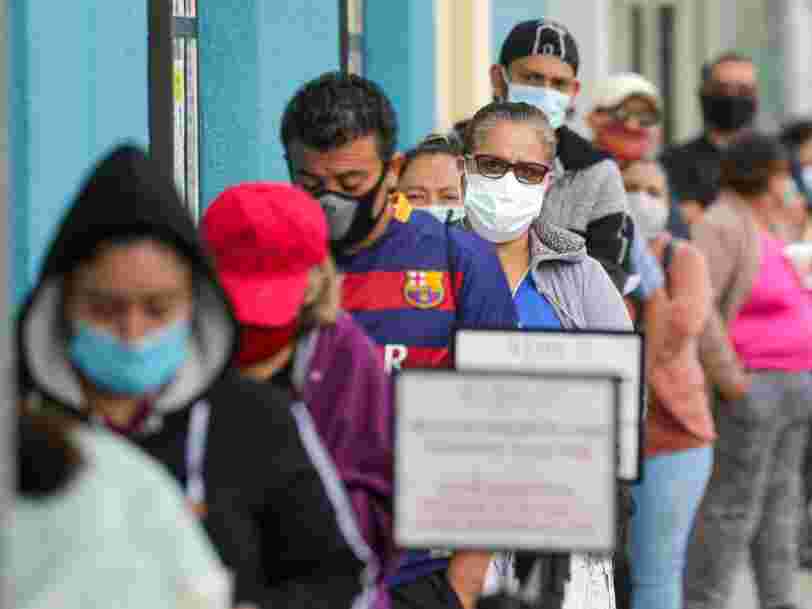CDC says there's no evidence of a 'USA variant' of the coronavirus, dismissing rumors stoked by the White House task force
Hilary Brueck,Aylin Woodward- coronavirus
-
Recevoir tous les articles sur ce sujet.
Vous suivez désormais les articles en lien avec ce sujet.
Voir mes sujets suivisCe thème a bien été retiré de votre compte

A White House report suggests a "USA variant" may be responsible for the recent coronavirus surge. The CDC says there's no evidence of that.
- The White House coronavirus task force shared a report with states saying a possible "USA variant" may be responsible for the coronavirus surge.
- The report suggested the USA variant was more transmissible than the original virus, much like the strains reported in the UK and South Africa.
- But the CDC told Business Insider there's no evidence of a "USA variant" and that it could take months to identify whether a single strain is causing a spike in cases.
- Visit Business Insider's homepage for more stories .
The White House coronavirus task force sent states a report on Sunday warning that there might be a "USA variant" of the coronavirus. The variant could be fueling the unprecedented number of coronavirus cases and deaths in US, the report said, according to media outlets that obtained the document.
The report suggested this USA variant may be more transmissible than the original version of the virus that emerged in China, much like the new strains identified in the UK (B.1.1.7) and in South Africa (B.1.351).
But there is no scientific evidence yet that a more contagious version of the coronavirus has originated or started spreading in the US.
In a statement to Business Insider on Friday, the Centers for Disease Control and Prevention said: "To date, neither researchers nor analysts at CDC have seen the emergence of a particular variant in the United States as has been seen with the emergence of B.1.1.7 in the United Kingdom or B.1.351 in South Africa."
Human behavior has a large effect on transmission rates
The task force's report, according to CNBC , offered little information about how long the new US strain described might have been circulating, nor what mutations were included in its genetic profile.
Scott Gottlieb, a former commissioner of the Food and Drug Administration, told CNBC's Closing Bell that the task force's hypothesis about the existence of a USA variant is in part based on the fact that US and UK's pandemic growth curves are similar.
According to CNN , the task force's report said: "This fall/winter surge has been at nearly twice the rate of rise of cases as the spring and summer surges. This acceleration suggests there may be a USA variant that has evolved here, in addition to the UK variant that is already spreading in our communities."
Given the lack of evidence the task force provided, frustrated officials at the CDC tried to get the statements about the suspected variant removed from the recent report, but they were unsuccessful, according to the New York Times .
Even in the UK, the variant is not the only reason for the steep rise in cases.
"Human behavior has a very large effect on transmission - probably much larger than any biological differences in SARS-CoV-2 variants," Paul Bieniasz, a virologist at the Howard Hughes Medical Institute, previously told Business Insider .
The variant reported in the UK does have an increased reproductive, or R0, value - the average number of people one sick person infects. The number is 1.5 rather than 1.1, the World Health Organization announced in December , which means that 100 sick people will infect another 150, not 110, on average.
But mitigation measures like social distancing and masking play a big role in how much the virus spreads, regardless of its genetic mutations.
The US isn't sequencing enough genomes to spot new variants
To monitor the many versions of the coronavirus circulating worldwide - each separated by a handful of tiny changes in its genome - researchers genetically sequence samples of the virus and track the changes over time. UK researchers first pinpointed B.1.1.7 this way in mid-September.
But the US is behind many countries when it comes to keeping tabs on new variants. US researchers have genetically sequenced less than .01% of its coronavirus cases: 2.5 out of every 1,000 . In total, the US has only sequenced 51,000 coronavirus samples, the CDC reported . In the UK, labs are sequencing 45 out of every 1,000 cases.
So far, more than 50 B.1.1.7 cases have been confirmed across six states, and all but one of those people had no travel history, suggesting the strain has been spreading silently for some time.
"It's very likely that it's in every state," Chiu previously told Business Insider .
Even if a possible new USA variant were indeed responsible for an uptick in cases, pinpointing a connection could take months.
"There is a strong possibility there are variants in the United States; however, it could weeks or months to identify if there is a single variant of the virus that causes COVID-19 fueling the surge in the United States similar to the surge in the United Kingdom," the CDC told Business Insider in its statement.
Dr. Peter Hotez, a vaccine scientist at Baylor College of Medicine in Texas, said in a tweet on Thursday that "there are likely similar homegrown variants in US as well, it's just that no one is looking."
"Like everything else in our national public health response, we've come up small on virus genomic sequencing," he added.
Inscrivez-vous gratuitement à notre newsletter quotidienne
Via PakApNews